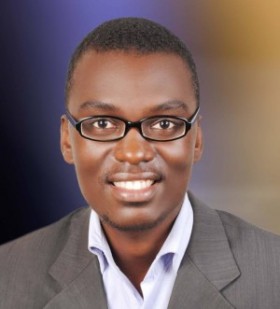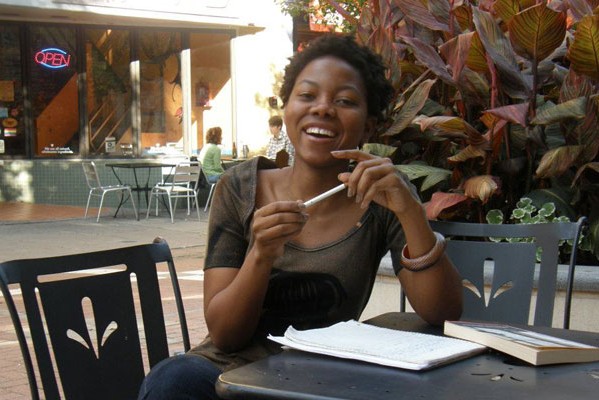From 18th to the 22nd June 2014, Kampala hosted The Writivism Festival, a literary feast attracting prominent names in contemporary African Literature. NoViolet Bulawayo participated in festival and was later hosted at the FEMRITE Readers and Writers club alongside Abubakar Adam Ibrahim and 2014 Writivism regional winners, Kelechi Njoku and Ssekandi Ronald Sseguja. The conversations touched on the most contentious topics of debate about contemporary African Writing. Bwesigye bwa Mwesigire brings you the highlights of the conversation.
There is a full-house when I, NoViolet Bulawayo, Kelechi Njoku and Abubakar Adam Ibrahim arrive at the FEMRITE courtyard where the Readers’ and Writers’ club meets weekly. Ronald Ssekandi Sseguja, Writivism 2014 regional prize (Eastern Africa) winner is already here. We apologize profusely for coming late, after a terrible Kampala traffic jam holding us up and to got the conversation going.
The first question is for NoViolet. She is a Man Booker Prize shortlisted writer (the first black African woman to achieve the feat) so the anticipation from the audience is not surprising. She rejects being called a big name. She says all writers are real people, and there should not be big and small names. There should be real names. Her down-to-earth attitude can’t be missed. There are no airs around her. She thwarts any attempt at creating the airs. I want to ask her what she thinks about the Africa39 list, compiled recently for Rainbow Book Club in collaboration with the Port Harcourt Book Capital, but I do not. I wasn’t sure how to phrase the question without letting my strong opinions about her exclusion from the list come through.
But there is another question that I can’t resist asking. About Helon Habila labelling her debut novel as poverty pornography. I actually do not ask the question. Ivan Mulumba Matthias does, and I add soup to it. NoViolet does not mince her words in response. “I do not write to please people. I can’t please everybody. I quickly learnt to be fine with it in 2011. Since I do not write for critics or Habila, I am fine with the poverty porn label.” Dayum. I do not know what to ask next.
I have had my own problems with middle class critics, writers and academics, largely responsible for the poverty pornography talk, ‘under-reading’ stories because they do not see themselves and their types in the stories. I am bothered that these critics seem unable to see beyond what they think is poverty. I have problems with what they define as poverty. Their inability to go beyond the poverty and see the humour and ‘storiness’ of the lives of those they deem poor. How can someone not see the mischievousness of Bastard, Darling, Godknows, Stina, Chipo and Sbho, the gang of children that form the core of We Need New Names, NoViolet Bulawayo’s debut novel? But I am not the guest today, so I do not express these opinions and continue moderating the conversation.
Rosey Sembatya asks why NoViolet took Darling to America. She thinks that the main character of We Need New Names lost a personality and became boring when she immigrated to the United States. NoViolet explains that there are not many immigrant narratives about Zimbabweans who left the country, and so it was important to take Darling outside and tell that story too. “I am interested in how space and identity influence our lives. How much we lose when we cross borders.” She tells us that she used to be among the noisiest in her class in Zimbabwe, but when she went to the United States, she was shocked culturally into silence.
Beatrice Lamwaka picks up the conversation at that point, and asks if it is true that all writers who want to ‘make it’ should immigrate to the West. NoViolet agrees and disagrees at the same time. She notes that she could not have done a Master of Fine Arts (MFA) in Creative Writing had she been in Zimbabwe because no university offers the program. But then she adds that not everyone who has gone to the West has ‘made it’. She uses this chance to talk about why she is returning to Africa. “It is important to support promising dreams of African Literature on the continent”, she says. She sits on the Board of Trustees of the Writivism program, that identifies, mentors and promotes African writing from the continent. Her trip to Uganda is to participate in the 2014 Writivism Festival among other activities.
As I said earlier, NoViolet isn’t alone at the FEMRITE conversation. She is featured alongside Abubakar Adam Ibrahim, arts editor of The Sunday Trust, a judge for the 2014 Writivism Prize and renown short story writer and playwright. Kelechi Njoku and Ssekandi Ronald Sseguja, 2014 Writivism regional winners for Western and Eastern regions respectively are also here. I choose to take them to Selasi’s 2013 speech, in which she declared that African Literature does not and should not exist. I ask them what they think of this. Should African Literature be abolished? Be made to disappear.
Abubakar tells us that whether African Literature exists or not is not important. He thinks that the debate is exaggerated. He says that when he is writing, he never tells himself that he is writing an African story. He just writes. The rest is the business of the academics. Kelechi agrees with him. He is not bothered by the debate. Any position is fine. NoViolet takes a strong stand on the matter. African Literature exists to her. She is interested in where literature comes from. She notes that African literature was never recognized by gatekeepers of so-called ‘human’ literature. Its existence is thus in itself a protest against what was essentially ‘European’ literature masquerading as universal ‘human’ literature. She adds; “Literature does not become less of literature because it is African. I am Zimbabwean and so everything I produce is African”. Ssekandi agrees. I am pleased. How can literature, cultures of a whole continent disappear? I want to thank NoViolet for spelling out why African Literature will never disappear, but I restrain myself. I must remain a balanced moderator.
Just before concluding the conversation, Barbara Oketta asks what Abubakar Adam Ibrahim and NoViolet Bulawayo are doing for their communities. Being moderator, I restrain myself again from wondering aloud why writers must do something for their communities, questions other professionals like engineers, lawyers etc. are seldom asked. Abubakar tells us that he has been doing workshops in Nigeria but also that he is a pillar of the Writivism program, as a form of giving back to the community. NoViolet informs us of a literary journal in Zimbabwe that she is establishing soon, and a workshop that she is associated with, besides her contributions to the Writivism program. What she does not mention, but Glaydah Namukasa had mentioned earlier is that she gifted a fellowship that came with her book winning the Etisalat Prize for Literature, to Yewande Omotoso, who she deemed more in need of the fellowship. Such a big heart, she has.
Abubakar and Kelechi are flying to Abuja this very evening and so we enjoy the tea and maize alongside conversation, courtesy of FEMRITE in a hurry, in order to beat the airport road traffic. As we leave, we do not feel less for being enthusiasts of African Literature, thanks to NoViolet Bulawayo’s re-assurance.
Post image via Gorge Town University
 Bwesigye bwa Mwesigire is a co-founder of the Writivism program of the Center for African Cultural Excellence and teaches at Uganda Christian University.
Bwesigye bwa Mwesigire is a co-founder of the Writivism program of the Center for African Cultural Excellence and teaches at Uganda Christian University.









everything i produce is african | semper aliquid novi africam adferre August 29, 2014 02:04
[…] The Ugandan promoter of literature Bwesigye bwa Mwesigire took some time to talk to Bulawayo and you find some of the main topics of this converstation here. […]